Paris 2024 Olympics Kicks Off: Spain Sends Record-Breaking Delegation
The 2024 Summer Olympics, officially known as the Games of the XXXIII Olympiad and branded as Paris 2024, began with an extraordinary opening ceremony on July 26, 2024. This international multi-sport event is taking place in France until August 11.
Arson Attacks Disrupt French Rail Network
The day of the opening ceremony got off to a rocky start as France‘s high-speed railway network was targeted by a series of arson attacks. These coordinated acts caused severe disruptions on the country’s busiest rail lines. The state-owned railway operator, SNCF, reported that installations along TGV lines connecting Paris with the west, north, and east were hit, resulting in significant delays and cancellations.
‘This is a massive attack on a large scale to paralyse the TGV network,’ the SNCF stated. French Interior Minister Gérald Darmanin assured that security forces were working swiftly to make arrests and confirmed that there was no immediate threat to the ceremony.
Unique and Historic Opening Ceremony
Despite the challenges, the opening ceremony of Paris 2024 was a dazzling display of French culture and history. For the first time, the Parade of Nations took place outside a stadium, with athletes being transported through the center of Paris on the River Seine. An estimated 320,000 spectators lined the Seine, including numerous A-list celebrities, to witness the spectacle.
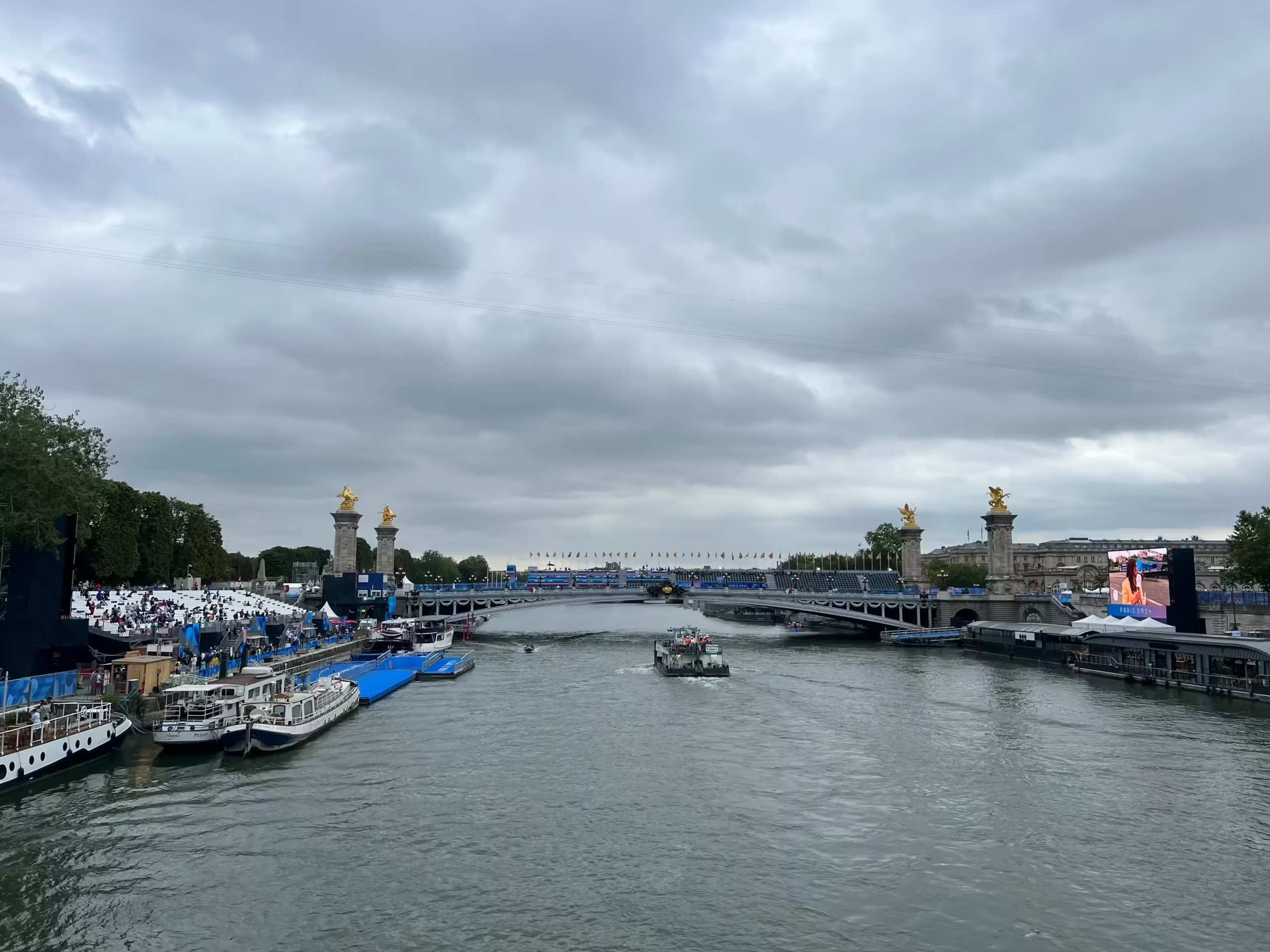
Iconic Locations and Performances
The ceremony featured performances by Lady Gaga, heavy metal band Gojira, and the Bells of Notre Dame rung for the first time since the cathedral was destroyed by fire. The Eiffel Tower, decorated with Olympic rings, served as a stunning backdrop for the athletes as they disembarked their boats and walked across a stage shaped like the Paris landmark.
Revolutionary Spirit and Performances
The opening ceremony paid homage to France’s revolutionary past with numerous artistic performances. Pianist Sofiane Pamart and singer Juliette Armanet delivered a powerful rendition of John Lennon and Yoko Ono’s ‘Imagine.’ After the song concluded, ‘We all stand and call for peace’ flashed on screens in English.
Torch Relay Highlights
The Olympic torch made its final stop of its journey from Greece to Paris by floating down the river before the official lighting of the flame. Team Greece, as tradition dictates, led the procession as the originators of the Olympics. Following them was the Refugee Olympic Team, making their third appearance at an Olympic Games since being formed for Rio 2016.
The National Olympic Committees paraded in French alphabetical order, with a few exceptions. Australia and the United States paraded at the end, right before hosts France, as the next two Olympic Games – Brisbane 2032 and Los Angeles 2028 – will be held in those countries.
Spain’s Record-Breaking Delegation
Spain is participating with a record-breaking delegation of 382 athletes, the second-largest in its history, only behind Barcelona 1992. For the first time, the number of female athletes (192) surpasses that of male athletes (190), highlighting the growing strength of women’s sports in Spain. The Spanish team will compete in 37 disciplines, including new additions like skateboarding and surfing.
Summary of Spanish Athletes by Sport
- Athletics: 58 (26 men and 32 women)
- Badminton: 2 (1 man and 1 woman)
- Basketball: 24 (12 men and 12 women)
- 3×3 Basketball: 4 women
- Handball: 28 + 3 reserves (14 men and 14 women)
- Boxing: 6 (5 men and 1 woman)
- Cycling (Road): 5 (3 men and 2 women)
- Cycling (Track): 2 men
- Mountain Biking: 2 men
- Sport Climbing: 2 (1 man and 1 woman)
- Fencing: 2 (1 man and 1 woman)
- Football: 36 + 8 reserves (18 men and 18 women)
- Artistic Gymnastics: 8 (5 men and 3 women)
- Rhythmic Gymnastics: 7 women
- Trampoline Gymnastics: 2 (1 man and 1 woman)
- Golf: 4 (2 men and 2 women)
- Equestrian: 8 + 1 reserve (men)
- Field Hockey: 32 + 6 reserves (16 men and 16 women)
- Judo: 9 (5 men and 4 women)
- Swimming: 18 (9 men and 9 women)
- Open Water Swimming: 3 (2 women and 1 man)
- Artistic Swimming: 8 women
- Modern Pentathlon: 1 woman
- Canoe Sprint: 16 (9 men and 7 women)
- Canoe Slalom: 5 (3 men and 2 women)
- Rowing: 9 (6 men and 3 women)
- Diving: 4 (2 men and 2 women)
- Skateboarding: 5 (3 men and 2 women)
- Taekwondo: 4 (2 men and 2 women)
- Tennis: 8 (6 men and 2 women)
- Table Tennis: 2 (1 man and 1 woman)
- Archery: 2 (1 man and 1 woman)
- Shooting: 4 (2 men and 2 women)
- Triathlon: 5 (3 men and 2 women)
- Sailing: 13 (6 men and 7 women)
- Beach Volleyball: 6 (2 men and 4 women)
- Water Polo: 26 (13 men and 13 women)
A Spectacular Conclusion to the Opening Ceremony
The Olympic Oaths were a solemn moment in the ceremony, with France’s flagbearers, Florent Manaudou and Mélina Robert-Michon, representing the athletes in taking the Olympic Oath. They promised to abide by the rules and uphold the standards of fair play. This was followed by a Coaches’ Oath and a Judges’ Oath.
The iconic Zinedine Zidane then walked down the stage to take the torch from the mysterious torchbearer. As he looked on, Rafael Nadal of Team Spain carried the flame during the opening ceremony, marking a significant moment for the Spanish delegation.
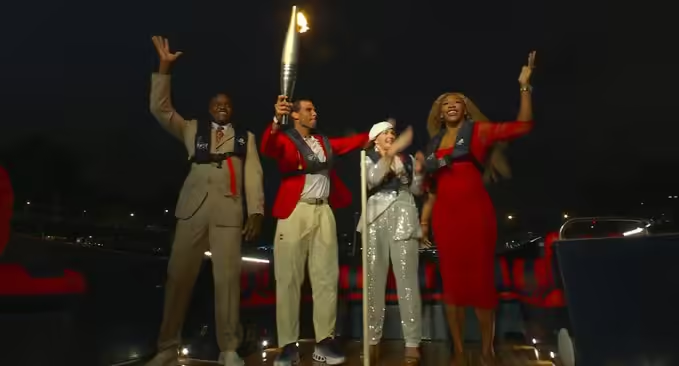
The Olympic Rings Illuminate Paris
Designed by Baron Pierre de Coubertin in 1913, the Olympic Rings, one of the most recognizable symbols of the Olympic Games, made their appearance. One by one, the rings on the Eiffel Tower were lit up, followed by a stunning light show from the tower itself.
Legends Join Nadal with the Torch
The torch journey continued down the Seine in a boat accompanied by Nadal, Serena Williams, Carl Lewis, and Nadia Comaneci. Amélie Mauresmo, the former world number one and current director of the French Open, took the flame next. She handed it off to French basketball legend and former NBA star Tony Parker as they jogged past the Louvre and its pyramid.
Céline Dion’s Triumphant Return
In a heartwarming and powerful performance, Céline Dion, who had withdrawn from public engagements due to Stiff Person Syndrome, made a remarkable comeback. She performed Édith Piaf’s “Hymne à l’amour,” written for Piaf’s love, boxer Marcel Cerdan. Dion’s performance on the Eiffel Tower concluded the ceremony, leaving the audience in awe.
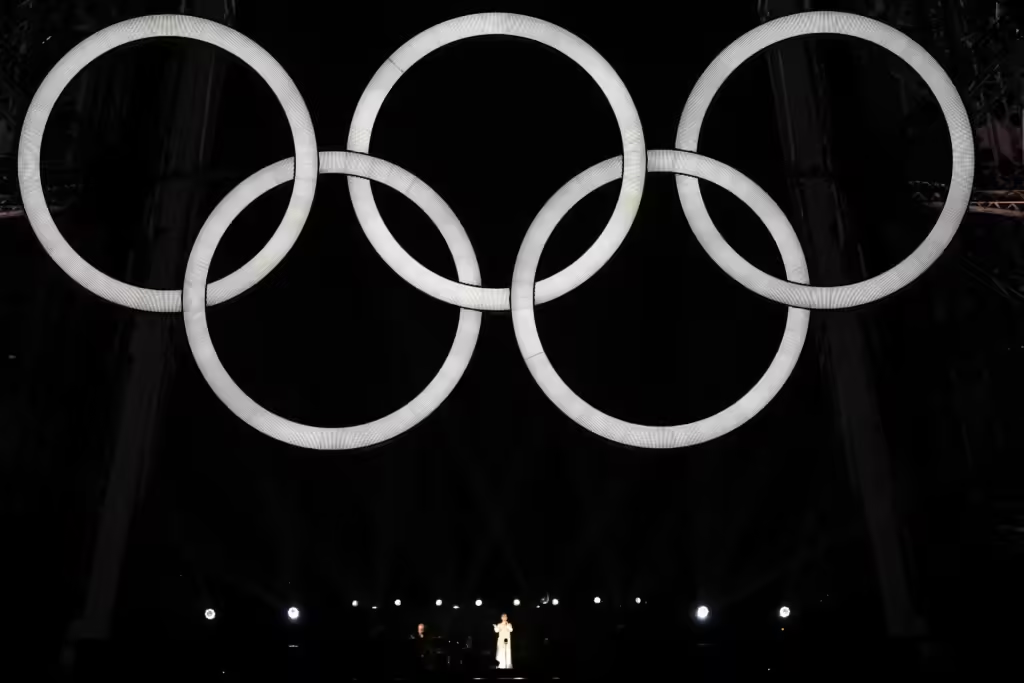
Lighting the Cauldron
The final act of the evening saw the torchbearers, now a group of 18 Olympians and Paralympians, approach the cauldron. Teddy Riner and Marie-José Pérec were honored as the final torchbearers. The cauldron, located in the Jardin des Tuileries and aligned with the Louvre, Place de la Concorde, the Champs-Élysées, and the Arc de Triomphe, was an engineering marvel. A ring of flames spanning seven meters in diameter, with a hot air balloon attached to it, rose 30 meters high—a nod to the first hydrogen-powered balloon flight in 1783. As the cauldron was lit, the balloon lifted it high into the Paris sky, symbolizing the spirit of the Games.
Looking Forward to the Games
The Paris 2024 Olympics began with a ceremony that showcased the best of French culture and international sportsmanship. Despite early setbacks, the spirit of unity and competition prevailed, setting the stage for what promises to be an unforgettable Olympic Games.
Did you watch the opening ceremony?
Let us know what you think in the comments…
Thank you so much for your support! Reach out to us on Facebook and Instagram
For those interested in relocating to Spain we have created a Facebook Group How to Move to Spain to help you throughout the process. We will provide helpful free printables to keep you on track, online events to inform and support your journey, and above all create a community where you can ask questions and get advice. Please feel free to join!
Share this content:
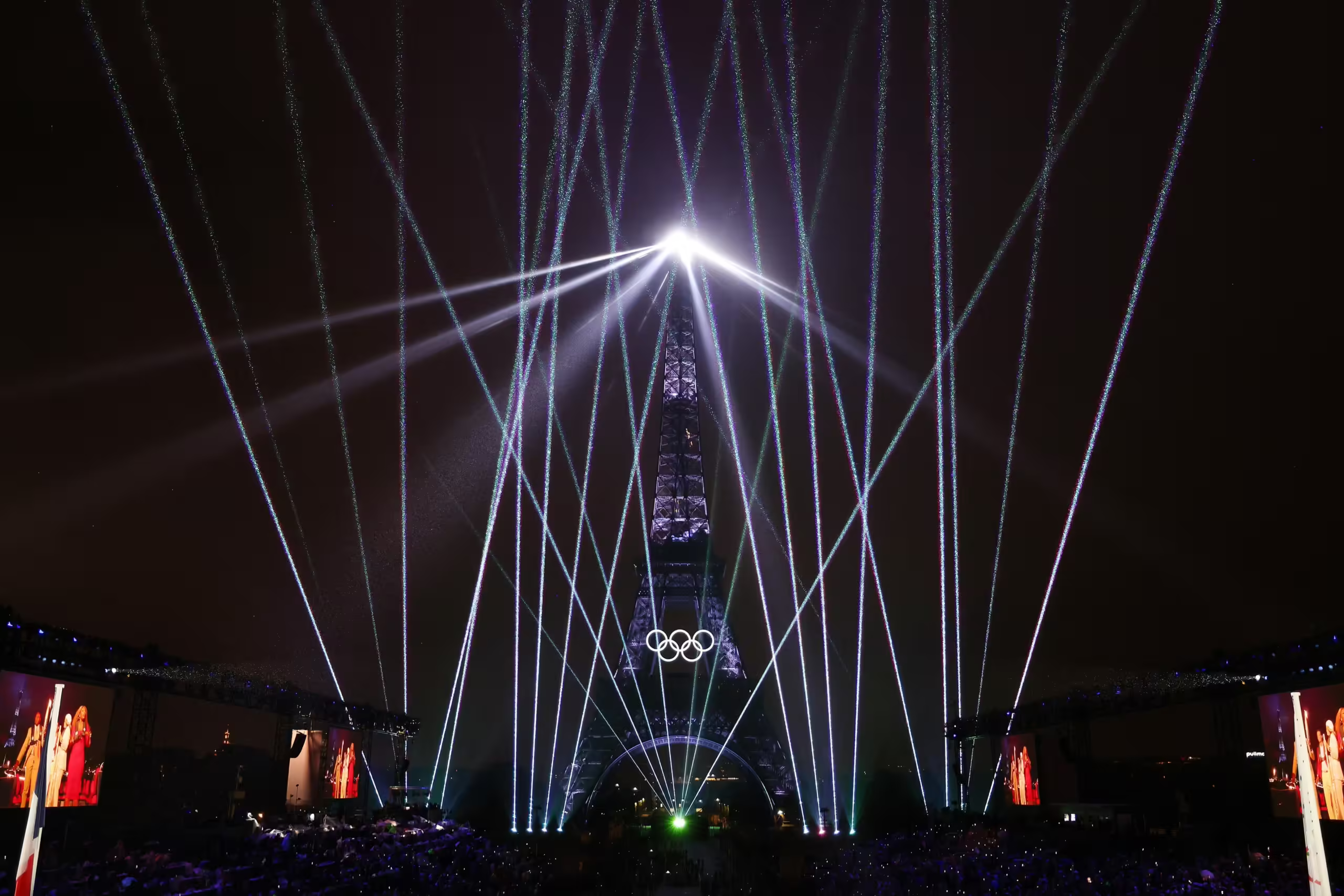

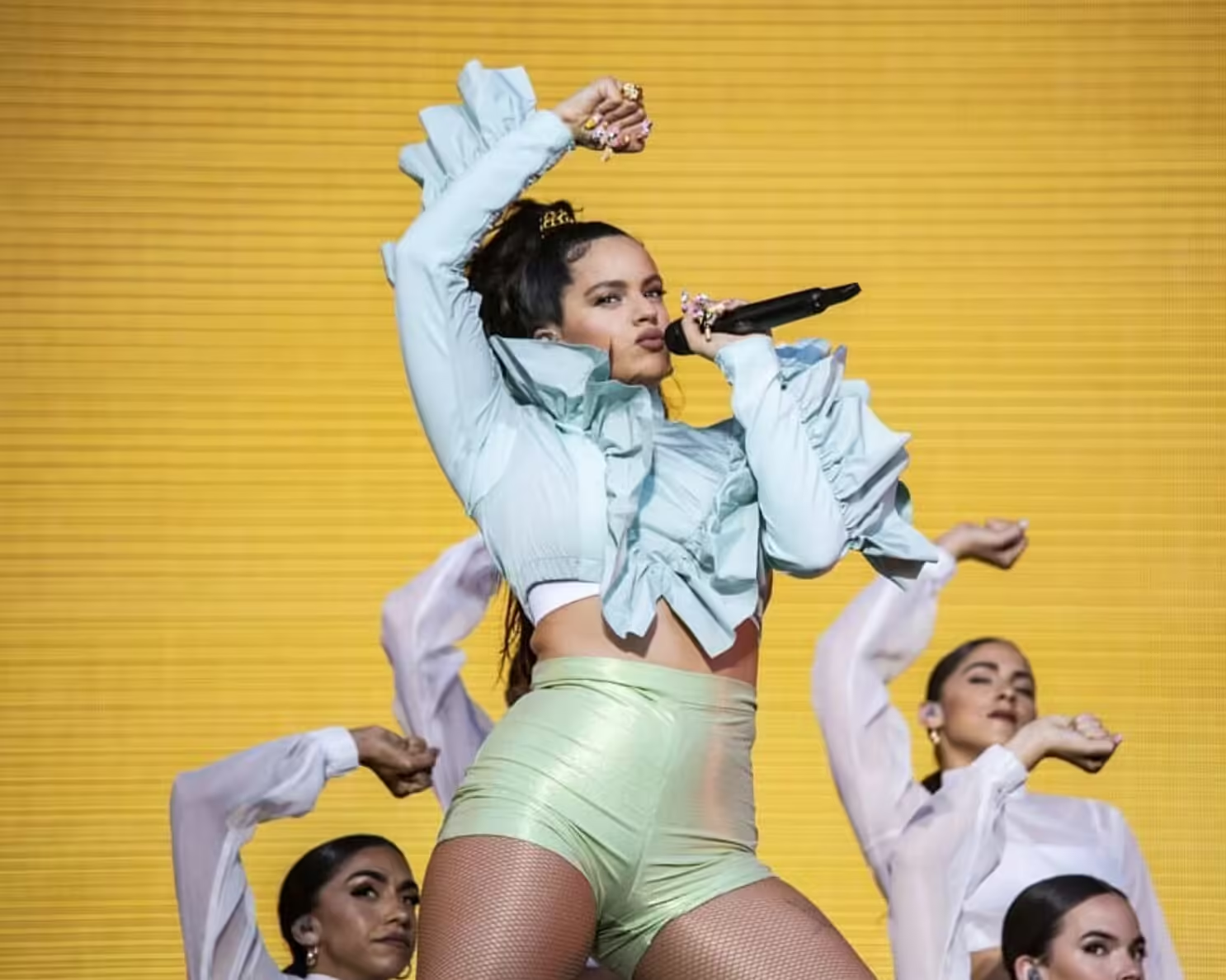
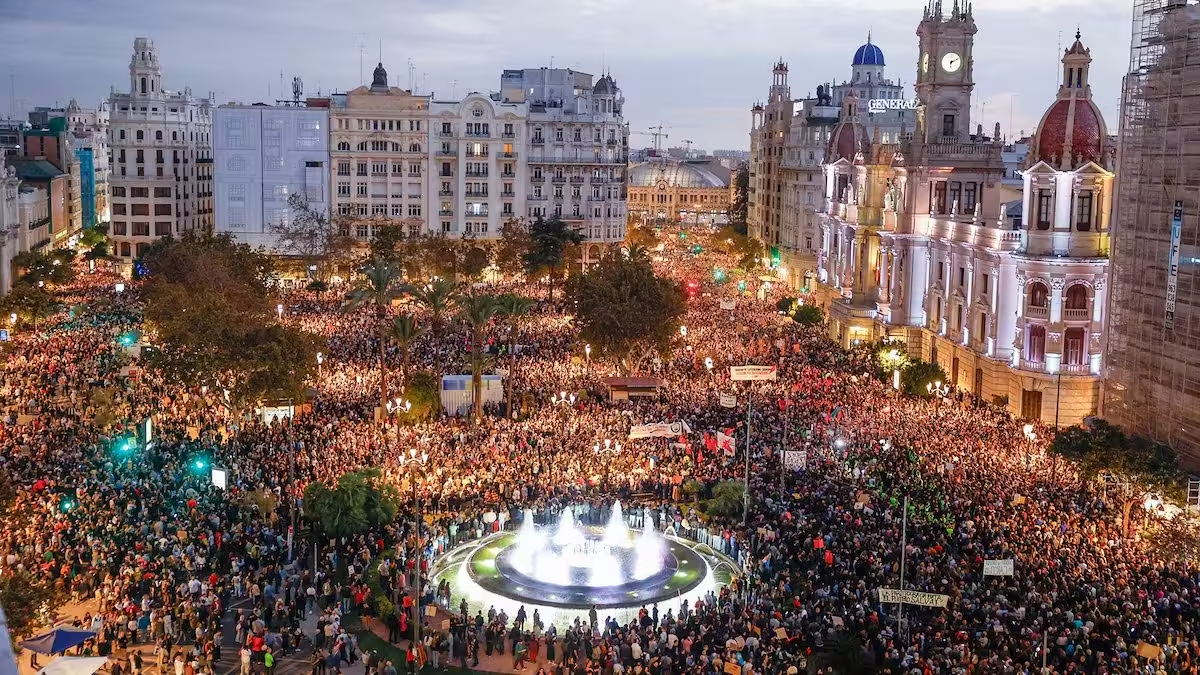
1 comment